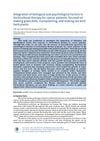19 citations,
January 2012 in “Dermatology” Topical human epidermal growth factor may effectively treat acne caused by cancer medication.
 18 citations,
January 2017 in “Postępy Dermatologii i Alergologii”
18 citations,
January 2017 in “Postępy Dermatologii i Alergologii” EGFR inhibitors can cause various skin issues during cancer treatment, and managing these is important for patient care.
 2 citations,
June 2005 in “Clinical Oncology”
2 citations,
June 2005 in “Clinical Oncology” A man's bald spot grew hair after starting cancer treatment with gefitinib.
1 citations,
May 2017 in “Journal of cosmetic and laser therapy” Lasers can help reduce skin side effects from cancer treatment.
1 citations,
May 2013 in “Implant dentistry” Haircuts and medical growth factors do not cause cancer.
 1 citations,
March 2004 in “Journal of the American Academy of Dermatology”
1 citations,
March 2004 in “Journal of the American Academy of Dermatology” ZD1839, a cancer drug, can cause mild skin rashes that are treatable without stopping the medication.
72 citations,
November 2017 in “Journal of developmental biology” The Hedgehog signaling pathway is important for skin and hair growth and can lead to cancer if it doesn't work right.
 4 citations,
March 2012 in “Annals of oncology”
4 citations,
March 2012 in “Annals of oncology” New treatment with green tea polyphenols and nicotinamide improves skin problems from cancer therapy.
 66 citations,
April 1995 in “The journal of cell biology/The Journal of cell biology”
66 citations,
April 1995 in “The journal of cell biology/The Journal of cell biology” A new protein was made to detect specific skin cell growth receptors and worked in normal skin but not in skin cancer cells.
 1 citations,
March 2010 in “Internal medicine journal”
1 citations,
March 2010 in “Internal medicine journal” A 72-year-old man with sudden taste issues and hair growth was diagnosed with a severe stomach cancer and died within 5 months.
December 2022 in “Journal of The American Academy of Dermatology” Low-dose oral minoxidil combined with topical minoxidil improves hair growth in breast cancer patients with therapy-induced hair loss.
July 2021 in “Plastic and reconstructive surgery. Global open” Radiation therapy in breast cancer patients changes gene expression related to DNA damage, fibroblast growth, and hair follicle development, which could help improve treatment for radiation-induced fibrosis.
 2 citations,
October 2021 in “Exploration of targeted anti-tumor therapy”
2 citations,
October 2021 in “Exploration of targeted anti-tumor therapy” Breast cancer hormone therapy can cause hair loss, which can be treated with daily applications of specific topical solutions like minoxidil and hydrocortisone butyrate.
 March 2024 in “Frontiers in genetics”
March 2024 in “Frontiers in genetics” Different types of fibroblasts play specific roles in wound healing and cancer, which could help improve treatments.
November 2022 in “Journal of Investigative Dermatology” EGFR is crucial for preventing hair follicle inflammation and hair loss.
 July 2019 in “Acta horticulturae”
July 2019 in “Acta horticulturae” Horticultural therapy helped cancer patients feel hopeful and positive about their disease experience.
April 2012 in “Cancer research” Blocking mTORC1 may help prevent skin cancer by stopping the growth of certain skin stem cells.
 127 citations,
January 2015 in “Journal of Biological Rhythms”
127 citations,
January 2015 in “Journal of Biological Rhythms” The skin's internal clock affects healing, cancer risk, aging, immunity, and hair growth, and disruptions can harm skin health.
 88 citations,
July 2014 in “Journal of the American Academy of Dermatology”
88 citations,
July 2014 in “Journal of the American Academy of Dermatology” Targeted cancer therapies often cause skin reactions, so dermatologists must manage these effects.
 35 citations,
May 2008 in “Journal of Clinical Oncology”
35 citations,
May 2008 in “Journal of Clinical Oncology” A cancer patient died from a severe skin reaction after taking the drug cetuximab.
 31 citations,
May 2015 in “Stem Cell Reports”
31 citations,
May 2015 in “Stem Cell Reports” Stem cells and their surrounding environment in hair follicles work closely together, affecting hair growth and having implications for cancer and tissue regeneration.
 30 citations,
December 2011 in “Journal of biological chemistry/The Journal of biological chemistry”
30 citations,
December 2011 in “Journal of biological chemistry/The Journal of biological chemistry” Keratin 17 is modified by RSK1 in response to growth and stress, affecting skin growth and stress response.
 12 citations,
February 2010 in “Journal of The American Academy of Dermatology”
12 citations,
February 2010 in “Journal of The American Academy of Dermatology” A cancer drug caused unusual hair growth on a 100-year-old man's scalp and eyelashes.
 5 citations,
September 2010 in “Cancer Prevention Research”
5 citations,
September 2010 in “Cancer Prevention Research” The research suggests new treatments for skin cancer could target specific cell growth pathways.
 4 citations,
February 2018 in “Journal of Investigative Dermatology”
4 citations,
February 2018 in “Journal of Investigative Dermatology” The document concludes that a protein involved in hair growth may link to baldness and that more research is needed on its role in hair loss and skin cancer treatments.
 4 citations,
January 1992 in “Clinical Oncology”
4 citations,
January 1992 in “Clinical Oncology” Some cancer treatments can cause abnormal fine hair growth.
 2 citations,
March 2020 in “Cell”
2 citations,
March 2020 in “Cell” Elaine Fuchs' research shows how skin stem cells maintain health, aid in healing, and are involved in cancer.
 July 2023 in “Dermatology practical & conceptual”
July 2023 in “Dermatology practical & conceptual” Some lung cancer patients treated with EGFR inhibitors may develop a hair loss condition similar to folliculitis decalvans.
 November 2022 in “The journal of investigative dermatology/Journal of investigative dermatology”
November 2022 in “The journal of investigative dermatology/Journal of investigative dermatology” Targeted cancer therapies can cause skin side effects, but activating SOS in the skin may help reduce them.
 October 2013 in “Journal of Investigative Dermatology”
October 2013 in “Journal of Investigative Dermatology” Collagen VII helps skin heal and stay strong, sirolimus may lower skin cancer risk in kidney transplant patients, high-molecular-mass hyaluronan helps naked mole rats resist cancer, dermal γδ T cells aid in hair growth in rodents, and overexpression of IL-33 in mouse skin causes itchiness, offering a model for studying allergic inflammation treatments.





















